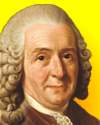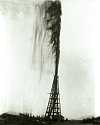
Research Ship Trapped in Ice Almost a Year (1902-3)
On 10 Jan 1949, Erich Dagobert von Drygalski died, a German geographer and glaciologist who discovered a volcano, free of ice, on the Antarctic continent. He named it Gaussberg, after the name of his research ship Gauss in which he led the German South Polar Expedition (1901-03). The ship became trapped in frozen seas and the team spent almost a year (21 Feb 1902 to 8 Feb 1903) making sledge expeditions from the immobile ship, including geological and magnetic surveys. The volcano was 50 miles west of this location. He also ascended to an altitude of 1600-ft in a balloon that was part of the equipment carried on the voyage. There were 32 men in all—5 scientists, 5 naval officers and 22 regular crew. Upon his return, he published scientific reports in a series of 20 volumes. In 1910, he took part in Count Zeppelin's expedition to Spitsbergen. There remains a record of the Seige of the South Pole, the story of the Antarctic Exploration in an excerpt from Early Expeditions of the Twentieth Century by Hugh Robert Mill (1905). When you read it, watch for the role of the penguins in getting the ship away from her icy trap.
An earlier article on von Drygalski's South Polar Expeditions from the Monthly Weather Review (1901) records the forward-looking expectations for the work he would accomplish.

On 10 Jan 1683, Danish geologist Nicolaus Steno was born, who established some of the most important principles of modern geology. Today's book pick is: The Seashell on the Mountaintop, by Alan Cutler, who reveals why Steno can rightly be called “the father of geology.” Steno's genius for anatomy led him to work on the mystery of fossils as actual remains of animals, and the question of how seashells could be found in the rocks of mountains far from the sea. He hypothesized that layers of earth formed sediments in a sequence, recording a series of events and telling a story about the age of the earth. Cutler is an engaging story-teller, who invokes the thrill of scientific discovery. This is a very popular book: of 24 Amazon reader reviews, 17 gave five stars and 6 gave four stars.
It is available from Amazon, typically about New from $14.11. Used from $2.60. (As of earlier time of writing - subject to change.)
 | A herbarium is better than any illustration; every botanist should make one. |
 | The traditional boundaries between various fields of science are rapidly disappearing and what is more important science does not know any national borders. The scientists of the world are forming an invisible network with a very free flow of scientific information - a freedom accepted by the countries of the world irrespective of political systems or religions. ... Great care must be taken that the scientific network is utilized only for scientific purposes - if it gets involved in political questions it loses its special status and utility as a nonpolitical force for development. |
 | In the case of those solids, whether of earth, or rock, which enclose on all sides and contain crystals, selenites, marcasites, plants and their parts, bones and the shells of animals, and other bodies of this kind which are possessed of a smooth surface, these same bodies had already become hard at the time when the matter of the earth and rock containing them was still fluid. And not only did the earth and rock not produce the bodies contained in them, but they did not even exist as such when those bodies were produced in them. |
| Before you look at today's web page, see if you can answer some of these questions about the events that happened on this day. Some of the names are very familiar. Others will likely stump you. Tickle your curiosity with these questions, then check your answers on today's web page. | |
| Births | |
 | Robert Woodrow Wilson, born 10 Jan 1936, was an American radio astronomer who shared, with his coworker Arno Penzias, the 1978 Nobel Prize for Physics made a discovery using a microwave horn antenna at Bell Laboratories, Holmdel, New Jersey in 1964. What was this discovery? |
 | On 10 Jan 1638, Nicolaus Steno was born, a Danish scientist who first made unprecedented discoveries in anatomy, then established some of the most important principles of modern geology. In Prodromus (1669), he published the important principle of geology known as the law of superposition. What is the law of superposition? |
| Deaths | |
 | Lord Alexander R. Todd (1907-1977) was a British biochemist whose research on the structure and synthesis of nucleotides, nucleosides, and nucleotide coenzymes gained him the 1957 Nobel Prize for Chemistry. It was known that they are built up of three quite different "building stones": phosphoric acid, a sugar, and a heterocyclic base containing nitrogen, assembled in one macromolecule. Todd researched how they are connected to each other. Where are nucleotides found? |
 | A certain Swedish botanist and explorer (1707-1778) was the first to establish a precise biological classification, with a uniform system for naming organisms by genera and species of organisms. Who was this scientist? |
| Events | |
 | On 10 Jan 1949, RCA introduced a new form of phonograph record in the U.S. What was this new type of record? |
 | On 10 Jan 1901, the discovery of oil at Spindletop marked the beginning of major oil finds in that U.S. state. Which state? |
Fast answers for the previous newsletter for January 9: DNA Fingerprinting for unique forensic identification of humans other organisms from their DNA material • pelican • Puffing Billy • Caroline Lucretia Herschel • decade including the year 1839 • Albert Einstein.
 If you enjoy this newsletter, the website, or wish to offer encouragement or ideas, please send feedback by using your mail reader Reply button.
If you enjoy this newsletter, the website, or wish to offer encouragement or ideas, please send feedback by using your mail reader Reply button. Your click on a Facebook, StumbleUpon, or other social button on the site webpages is also a welcome sign of appreciation. Thank you for using them.
© This newsletter is copyright 2020 by todayinsci.com. Please respect the Webmaster's wishes and do not put copies online of the Newsletter — or any Today in Science History webpage. (If you already have done so, please remove them. Thank you.) Offline use in education is encouraged such as a printout on a bulletin board, or projected for classroom viewing. Online, descriptive links to our pages are welcomed, as these will provide a reader with the most recent revisions, additions and/or corrections of a webpage. For any other copyright questions, please contact the Webmaster by using your mail reader Reply button.
--
If you do not want to receive any more newsletters, Unsubscribe
To update your preferences and to unsubscribe visit this link
Executive Real Estate Business Class
-
"It was like a man with wings. It wasn't like anything you'd see on TV or in a monster movie." ...
About the publisher
Search This Blog
Blog Archive
-
▼
2021
(585)
-
▼
January
(109)
- Ian Kershaw on why Hitler declared war on America
- On This Day for January 31 - Guy Fawkes executed i...
- Newsletter for Sunday 31 January.
- January 31: Slavery Abolished in the USA, Guy Fawk...
- On This Day for January 30 - “Great Soul” assassin...
- Newsletter for Saturday 30 January.
- January 30: Oliver Cromwell Ritually Executed, Mah...
- On This Day for January 29 - Iraq, Iran, and North...
- Newsletter for Friday 29 January.
- January 29: Romeo and Juliet, Coca-Cola and the Se...
- 'The Food That Built America' Is Back!
- On This Day for January 28 - Explosion of the spac...
- Newsletter for Thursday 28 January.
- Inside The Still-Mysterious Circumstances Of Heath...
- Demystified: What’s the Difference Between a Presi...
- On This Day for January 27 - Vietnam War ended, Wo...
- Newsletter for Wednesday 27 January.
- January 27: Kaiser Bill is Born, the Siege of Leni...
- You are now unsubscribed
- What The Wild West Actually Looked Like in 48 Reve...
- New Savings! $50 off Family Memberships
- On This Day for January 26 - First European settle...
- Newsletter for Tuesday 26 January.
- January 26: Catholic Counter-Reformation, British ...
- On This Day for January 25 - Claudius affirmed as ...
- Newsletter for Monday 25 January.
- January 25: São Paulo Founded, Charles Wilkes Disc...
- Queen Victoria and Prince Albert's marriage | Wors...
- On This Day for January 24 - Opportunity's Mars la...
- Newsletter for Sunday 24 January.
- January 24: Scouting for Boys, Apple's Macintosh a...
- On This Day for January 23 - Madeleine Albright sw...
- See All That's Interesting Most Popular Articles
- Please Confirm Subscription To Our Newsletter
- The "Alaskan Avenger" Who Attacked Sex Offenders W...
- On This Day for January 22 - Roe v. Wade ruling, L...
- Newsletter for Friday 22 January.
- On This Day for January 21 - First commercial Conc...
- Newsletter for Thursday 21 January.
- Need Context with Your News?
- Demystified: Where Do Honeybees Go in the Winter?
- On This Day for January 20 - Barack Obama sworn in...
- Newsletter for Wednesday 20 January.
- On This Day for January 19 - Rule in India transfe...
- Newsletter for Tuesday 19 January.
- On This Day for January 18 - German Empire establi...
- Newsletter for Monday 18 January.
- January 18: King of Siam Kills the Crown Prince of...
- Queen Victoria and Prince Albert: was their union ...
- On This Day for January 17 - Hawaiian monarchy ove...
- Newsletter for Sunday 17 January.
- January 17: US-Modoc War, the UN Security Council ...
- On This Day for January 16 - Beginning of Persian ...
- Newsletter for Saturday 16 January.
- January 16: Ivan the Terrible, Louis XVI's Death S...
- The Tragedy Of David Reimer, The Boy Forced To Liv...
- On This Day for January 15 - British Museum opened...
- Newsletter for Friday 15 January.
- January 15: Henry VIII and the Church of England, ...
- On This Day for January 14 - Premiere of Giacomo P...
- Newsletter for Thursday 14 January.
- January 14: The Dutch Conquer Malacca, the US Revo...
- Demystified: Why Does Water Freeze from the Top Down?
- On This Day for January 13 - Émile Zola's “J'accus...
- Newsletter for Wednesday 13 January.
- January 13: 1st Issue of "The Times" of London, Ch...
- On This Day for January 12 - Haiti severely damage...
- Newsletter for Tuesday 12 January.
- January 12: A Day of Coronation, Gandhi's Last Fas...
- On This Day for January 11 - Amelia Earhart's Hawa...
- Newsletter for Monday 11 January.
- January 11: Spices, Morse Code, Insulin and 55 Yea...
- The real history behind Bridgerton
- On This Day for January 10 - Common Sense publishe...
- Newsletter for Sunday 10 January.
- January 10: Thomas Paine Publishes Common Sense, T...
- On This Day for January 9 - Election of Mahmoud Ab...
- THE IGBO LANDING - HOW THEY COMMITTED SUICIDE
- Newsletter for Saturday 9 January.
- January 9: Joan of Arc's Trial, the Daguerreotype ...
- The Biggest Historical Discoveries From 2020 And M...
- On This Day for January 8 - Anniversary of Grimald...
- Newsletter for Friday 8 January.
- January 8: US National Debt Briefly Hits $0, Forma...
- On This Day for January 7 - Galileo's discovery of...
- Newsletter for Thursday 7 January.
- January 7: A Day of Invention - The Typewriter, Hy...
- On This Day for January 6 - Epiphany, Richard II i...
- Newsletter for Wednesday 6 January.
- January 6: Charles I put on Trial for Treason, FDR...
- Meet The Real-Life Goodfellas Whose True Stories W...
- On This Day for January 5 - Golden Gate Bridge con...
- Newsletter for Tuesday 5 January.
- January 5: Richmond Burns, The Nazi Party Forms, A...
- Last Call for 30% off Memberships
- On This Day for January 4 - Burma granted independ...
- Newsletter for Monday 4 January.
- January 4: The Colt Revolver, a 33 Year Strike and...
- Dangers of Victorian London| Roman history quiz | ...
- On This Day for January 3 - Martin Luther excommun...
-
▼
January
(109)
-
Blogroll
-
About
HistoryFact










0 comments:
Post a Comment